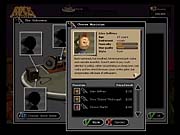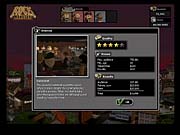Though it was released without any sort of fanfare, Rock Manager from DreamCatcher Interactive is actually a surprisingly clever and enjoyable little game. Rock Manager is a simple strategy game in which you manage different rock groups in nine different missions. You'll have to assemble a band, get a contract, license an album, sell lots of copies, get good press reviews, and go on world tour. The game has an annoying technical problem, it can seem a bit too limited, and it isn't always clear about your objectives or what you should do next. But it compensates for these shortcomings with good music and spirited voice acting that give the game a lot of personality.

Rock Manager is one of the most deceptive-looking budget-priced games this year. It retailed for $20 at release, and its plain black box (and the cartoon character on the box's inner fold) might make it seem like just another lousy management strategy game, but it isn't. Likewise, Rock Manager's cheerful-looking characters--musicians, record company executives, and rival bands--all seem like smiling, lighthearted characters from a children's Claymation show. At least until they open their mouths. Much of the game's voice work is delivered by British actors (some of whom try to sound like Americans), and it's mostly very convincing, very enthusiastic, and very profane. Your smiling, Gumby-esque musicians will curse profusely when they're upset at a bad gig, use expletives to describe how pleased they are about their album's success, and swear casually, even when they're just making conversation. Rock Manager's voice acting may surprise you the first time around, though you'll probably find it suits the game quite well. The game actually has at least a few different voice samples for each character in each situation--which, along with the voice work's generally high quality, makes sure that these samples don't get repetitive, at least for a while. But Rock Manager is definitely not for children.
Otherwise, the game looks decent and sounds great. You'll play through most of Rock Manager in a dimly lit city full of important buildings. You can visit recording studios, show venues, and even the docks, where you can meet with a shady cloak-and-dagger "businessman." This guy can cut underhanded deals for your band to give you good press or help you win an embarrassing court case. You use simple point-and-click interfaces to conduct all your business, including recording a new album. The game's music sounds great--your bands will generally choose and play a single song from a list of bland top-40 rock music, vacuous pop tunes, and obnoxious heavy metal songs, all of which sound appropriate. Each musician you'll hire will have three different styles of play, and you can experiment with these styles (and add techno-music distortions) when you're recording a demo and even save the song for later use, though you'll find that the best way to sign with a record label is to play it straight.
The fact that it rewards you for taking the most obvious approach is one of the few but sometimes annoying problems in Rock Manager. As another example, in each of the game's nine missions, you'll occasionally get a helpful hint about how to keep your band members happy, but no hints on how to accomplish your objectives. Additionally, the game will occasionally neglect to give you the opportunity to properly finish your mission. For instance, you may need to get a favorable review from a press publication, but you'll never actually get reviewed, even for months of game time, and you'll eventually go bankrupt and lose the mission. In addition, even though Rock Manager has both standard events (like signing up with a record label) and random events (like a rival group smearing your band in the papers), these events can sometimes seem arbitrary. Sometimes you'll play a great show at a club you've done extremely well at, and later, under the very same circumstances, you'll have a terrible showing.

In addition, Rock Manager has problems with its best quality: its sound. The game relies heavily on CD loading--too heavily, in fact. Since it only has 50MB and 150MB install options, Rock Manager generally loads all sound--including voice samples and music--directly from the CD. This can lead to some annoying pauses: You'll be about to hear your band's hit single or be halfway though a funny quip some character is making when the entire game will grind to a halt while your CD-ROM drive loads up the sample. The game should have offered some sort of full-install option that would have let you load all the music and sound to your hard drive. Finally, it's unfortunate that Rock Manager has what seems to be a limited repertoire of music and musicians. By the time you get to the very last mission in the game, you'll be able to access all of its musicians, but there just doesn't seem to be enough of them, or enough different songs to license. However, this is really more of a complaint than a criticism--the main reason you'll wish for more songs and musicians is because the few that Rock Manager does have are surprisingly great. And though the game has only nine missions, it'll take you some time to puzzle your way through all of them, and you'll have at least some incentive to go back to the earlier ones, as you'll be able to use the musicians you unlock over the course of the game in any of its levels.
Rock Manager is a surprising game. Its combination of cartoon-style characters and foul-mouthed dialogue may shock you. But what's most surprising about Rock Manager is that it's a budget-priced management game that's actually quite good.